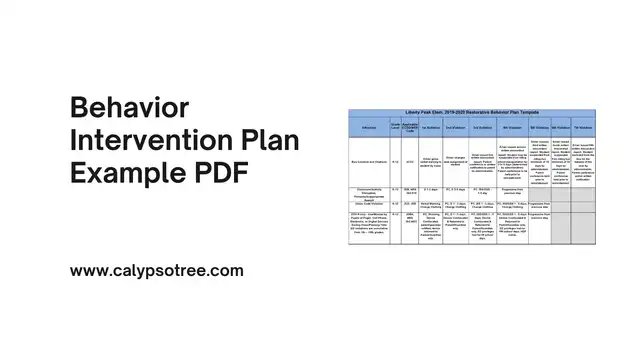Have you ever wondered what it’s like to be a pediatrician? Pediatricians are special doctors who take care of kids, from tiny babies to teenagers. They make sure kids stay healthy and help them feel better when they’re sick. This job description for a pediatrician will tell you all about this awesome job!
What is Pediatrics?
Pediatricians play a crucial role in ensuring the well-being of children by providing comprehensive health care and guidance.
Benefits of Being a Pediatrician
Being a pediatrician can be very rewarding. Here are some benefits:
- Helping Children: Pediatricians help children get better when they are sick and keep them healthy as they grow.
- Making a Difference: They can catch health problems early and help prevent serious issues.
- Building Relationships: Pediatricians often see the same children for many years. They get to know their patients and their families well.
- Variety of Work Settings: Pediatricians can work in hospitals, clinics, or their own private practices. They can choose a setting that fits their lifestyle.
- Job Security: There is always a need for doctors who care for children, so pediatricians have good job security.
Main Duties in a Pediatrician’s Job Description
Routine Check-Ups
- Monitoring Growth and Development
- One of the main jobs of a pediatrician is to make sure children are growing and developing as they should.
- During check-ups, they measure the child’s height and weight.
- If they notice any problems, they can help fix them early.
- Immunizations and Vaccinations
- Pediatricians give children vaccines to protect them from serious diseases.
- Pediatricians track which vaccines each child needs and ensure they get them at the right times.
Diagnosing and Treating Illnesses
- Common Childhood Illnesses
- Kids get sick often, and pediatricians are experts at determining what is wrong.
- Pediatricians know the best ways to help kids feel better quickly.
- Chronic Conditions
- Some children have long-term health problems, like asthma or diabetes.
- They work with families to create treatment plans and regularly check on the child’s progress.
Advising Parents and Guardians
- Nutrition and Healthy Lifestyle Tips
- Pediatricians advise parents about how to keep their children healthy.
- They might suggest eating lots of fruits and vegetables or playing outside daily.
- Developmental Milestones
- Parents often have questions about how their child is growing and developing.
- Pediatricians help by explaining what to expect at different ages.
- They can tell parents when their child should start walking or talking and what to do if they are worried about their child’s development.
Qualifications to Become a Pediatrician
Educational Requirements
- Undergraduate Degree: First, you need to finish college. Most students study biology or chemistry.
- Medical School: Next, you go to medical school for four years. Here, you learn about the human body and how to treat patients.
- Pediatric Residency: After medical school, you do a residency in pediatrics. This takes three years and gives you hands-on training with children.
Licensing and Certification
- USMLE or COMLEX Exams: To be a doctor, you must pass exams. Most take the USMLE, but some take the COMLEX.
- Board Certification in Pediatrics: After residency, you can get certified in pediatrics. This means you have special training in taking care of kids. You need to pass an exam for this.
Duration of Becoming a Pediatrician
Educational Timeline
Undergraduate (4 years)
The journey to becoming a pediatrician starts with an undergraduate degree. This takes about four years. During these years, students study basic subjects like biology, chemistry, and physics. These courses prepare them for the next step, which is medical school.
Medical School (4 years)
After earning a bachelor’s degree, students go to medical school. Medical school also takes four years. In the first two years, students spend most of their time in classrooms and labs. They learn about the human body, diseases, and treatments. In the last two years, they work in hospitals and clinics. Here, they see patients and learn from experienced doctors.
Residency (3 years)
Once medical school is finished, new doctors must complete a residency program in pediatrics. This residency usually takes three years. During residency, doctors work in hospitals and clinics, but now they focus only on children’s health. They learn how to treat kids, handle emergencies, and communicate with young patients and their families.
Fellowship (Optional, 1-3 years)
Some pediatricians choose to get even more specialized training. This is called a fellowship and it is optional. Fellowships can last from one to three years. During a fellowship, pediatricians focus on a specific area of children’s health, like cardiology or oncology. This extra training helps them become experts in their chosen field.
Where Do Pediatricians Work?
Hospitals
General Hospitals
Pediatricians can work in general hospitals. These are large hospitals where doctors treat patients of all ages. In these hospitals, pediatricians may work in emergency rooms, maternity wards, or pediatric units. They help children who are very sick or hurt.
Children’s Hospitals
Some pediatricians work in children’s hospitals. These hospitals are special because they only take care of kids. In children’s hospitals, everything is designed for young patients, from the equipment to the decor. Pediatricians in these hospitals often deal with more serious or complex health problems.
Private Practices
Solo Practice
In solo practice, a pediatrician works alone. They have their own office and take care of all their patients by themselves. This allows them to get to know their patients very well. However, running a solo practice also means handling all the business parts of the job, like billing and scheduling.
Group Practice
Some pediatricians work in group practices. This means they share an office with other doctors. They can work together and help each other out. Group practices can be a good choice because doctors can share the workload. If one pediatrician is busy, another can see their patients.
Clinics and Outpatient Centers
Community Health Clinics
Pediatricians may work in community health clinics. These clinics provide care for people in the local area. They often help families who do not have a lot of money or who do not have health insurance. Pediatricians in these clinics make sure all children get the medical care they need.
Specialty Clinics
Specialty clinics focus on specific types of medical care. Pediatricians in these clinics might work with children who have asthma, diabetes, or other chronic conditions. They provide specialized care and help manage these health problems.
Essential Skills for a Pediatrician
Medical Knowledge and Clinical Skills
Diagnosis and Treatment
Pediatricians need to know a lot about medicine to help children. They must be good at figuring out what is wrong when a child is sick. This is called diagnosis. After diagnosing the problem, they need to know how to treat it. Treatment can include giving medicine, suggesting lifestyle changes, or sometimes recommending surgery.
Emergency Care
Sometimes, children need help right away because they are very sick or hurt. Pediatricians must be ready to act fast in emergencies. They need to know how to handle things like asthma attacks, broken bones, or allergic reactions. Quick and calm actions can save lives.
Communication and Interpersonal Skills
Explaining Medical Conditions to Children and Parents
Pediatricians must explain medical conditions in a way that both children and their parents can understand. This means using simple words and being patient. For example, they might say, “Your ear hurts because there is an infection. We will give you medicine to make it better.” Clear communication helps children feel safe and parents feel informed.
Building Rapport with Young Patients
It’s important for pediatricians to build a good relationship with their young patients. This is called rapport. When children trust their doctor, they are more likely to talk about their problems and follow advice. Pediatricians might play games, tell jokes, or use toys to make children feel comfortable.
Problem-Solving and Critical Thinking
Developing Treatment Plans
Pediatricians need strong problem-solving skills to create the best treatment plans. They look at the symptoms, run tests, and think about different ways to help the child. A treatment plan might include medicine, therapy, or changes in diet and exercise.
Addressing Complex Cases
Sometimes, a child’s illness is complicated. It might take a lot of thinking and testing to figure out what is wrong. Pediatricians must use their critical thinking skills to address these complex cases. They might need to consult with other doctors or specialists. The goal is always to find the best solution for the child’s health.
Work-Life Balance for Pediatricians
Typical Work Hours
Full-Time and Part-Time Options
Pediatricians can choose to work full-time or part-time. Full-time pediatricians work about 40 hours a week. Part-time pediatricians work fewer hours, which can be helpful if they have other responsibilities or want more free time.
On-Call Duties
Sometimes, pediatricians need to be on call. This means they must be ready to work if there is an emergency, even at night or on weekends. On-call duties can be challenging, but they are important for providing care when children need it most.
Strategies for Balance
Time Management
To balance work and life, pediatricians need good time management skills. This means planning their day carefully and making sure they have time for both their patients and their personal lives. Using a schedule can help them stay organized.
Stress Reduction Techniques
Pediatricians often face stressful situations. To stay healthy and happy, they need to find ways to reduce stress. This might include exercise, hobbies, or spending time with family and friends. Taking breaks and relaxing helps them recharge and do their job well.
Differences Between a Pediatrician and a Family Doctor
Scope of Practice
Age Range of Patients
One big difference between pediatricians and family doctors is the age of their patients. Pediatricians only take care of children, from newborns to teenagers.
Specialization in Children’s Health
Pediatricians specialize in children’s health. This means they are experts in the health issues that affect kids. They understand how children’s bodies grow and change.
Training and Certification
Pediatric-Specific Training
Pediatricians go through special training that focuses only on children’s health. After medical school, they do a pediatric residency, where they learn how to care for kids. They also take exams to become board certified in pediatrics.
General Practice Training for Family Doctors
Family doctors have more general training. After medical school, they do a residency in family medicine. Family doctors can treat children, but they do not have the same specialized training as pediatricians.
Average Salary of a Pediatrician
Salary Estimates
According to Salary.com, the average salary for a pediatrician in the United States ranges from $170,000 to $310,000 per year. This estimate shows the difference between those just starting their careers and those with many years of experience.
ZipRecruiter
On ZipRecruiter, pediatricians in Massachusetts can make between $80 to $130 per hour. This means that over a year, depending on how many hours they work, their salary can vary widely.
Indeed
On Indeed, pediatricians in Texas earn between $160,000 to $250,000 per year. This shows that salaries can also depend on where you live and work.
Factors Influencing Salary
Location
Where a pediatrician works can greatly affect their salary. In some states or cities, the cost of living is higher, and so are the salaries. For example, pediatricians in Massachusetts might earn more per hour compared to those in other states.
Experience
Experience is another key factor. Pediatricians who are just starting might earn less than those with many years of experience. Over time, as they gain more skills and knowledge, their salaries usually increase.
Type of Practice
The type of practice also influences salary. Pediatricians working in private practices might earn differently than those working in hospitals or clinics. Those who own their practice might have the potential to earn more but also have more expenses to manage.
Salary Ranges
Entry-Level vs. Experienced Pediatricians
Entry-level pediatricians, who are new to the job, typically earn on the lower end of the salary range. As they gain more experience, their earnings increase. For instance, a new pediatrician might start with a salary closer to $170,000 per year, while an experienced one could earn up to $310,000 per year.
Geographic Variations
Salaries for pediatricians can vary based on geographic location. In places with a higher cost of living, like big cities, pediatricians might earn more. In rural areas, the salaries might be lower, but the cost of living is also lower. For example, a pediatrician in Texas might earn between $160,000 and $250,000 per year, while in other states, these numbers could be different.
References
- Salary.com Pediatrician Salary
- ZipRecruiter Pediatrician Salary
- Indeed Pediatrician Salary in Texas
These references provide detailed information on how much pediatricians can earn and the factors that can affect their salaries.
Challenges Faced by Pediatricians
Emotional and Physical Demands
Dealing with Sick Children
One of the most complex parts of being a pediatrician is seeing sick children. It can be very emotional to care for kids who are in pain or suffering from serious illnesses.
Long Working Hours
Pediatricians often work long hours. They might have to work nights, weekends, or holidays, especially if they are on call.
Administrative Duties
Paperwork and Documentation
Pediatricians have to do a lot of paperwork. This documentation helps them track a child’s progress and make informed decisions about their care.
Insurance and Billing Issues
Pediatricians also deal with insurance and billing issues. They must understand different insurance plans and help families get the necessary care.
Staying Updated with Medical Advancements
Continuing Medical Education (CME)
Courses and Seminars
Pediatricians need to keep learning throughout their careers. They attend courses and seminars to learn about the latest medical advances.
Online Learning Options
There are also online learning options for pediatricians. They can take courses and watch webinars from their computers.
Professional Organizations
American Academy of Pediatrics (AAP)
Pediatricians can join professional organizations like the American Academy of Pediatrics (AAP).
Conferences and Networking
Attending conferences is another way for pediatricians to stay updated. At these events, they can learn about new research and treatments.
Sample Job Description for a Pediatrician
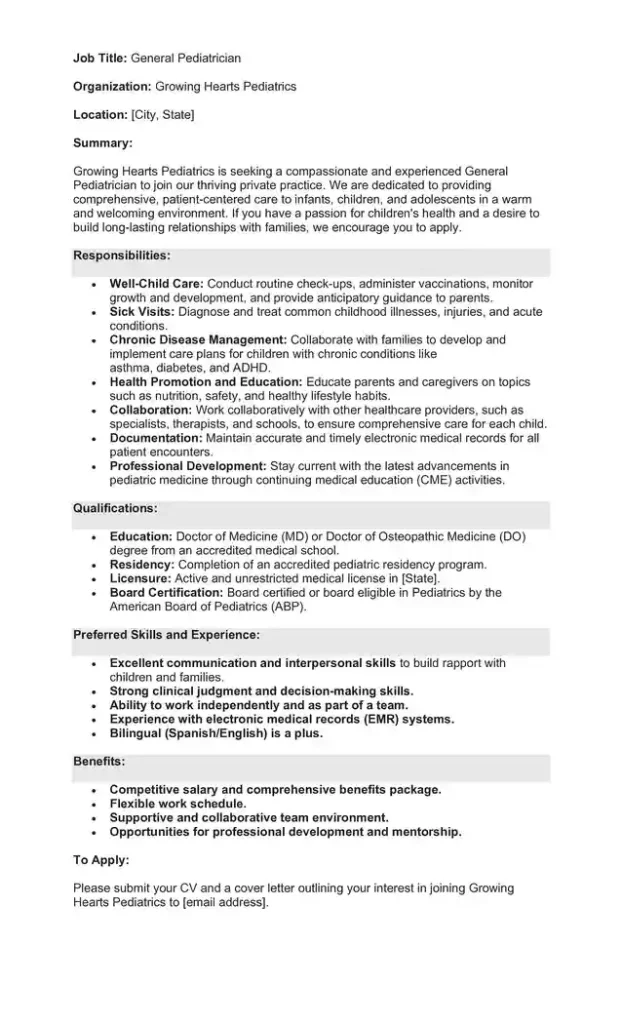
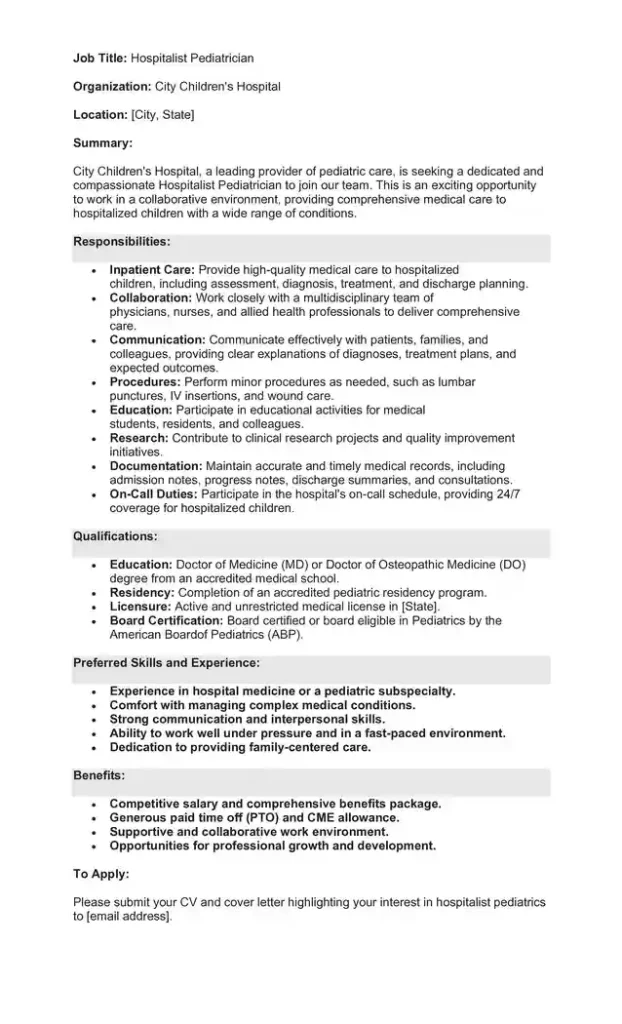
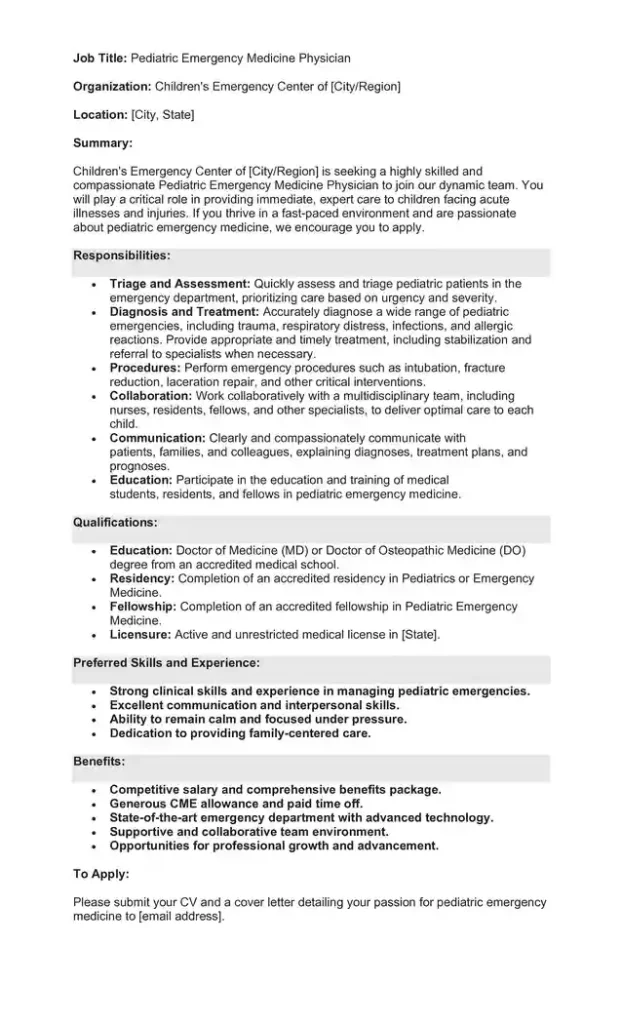
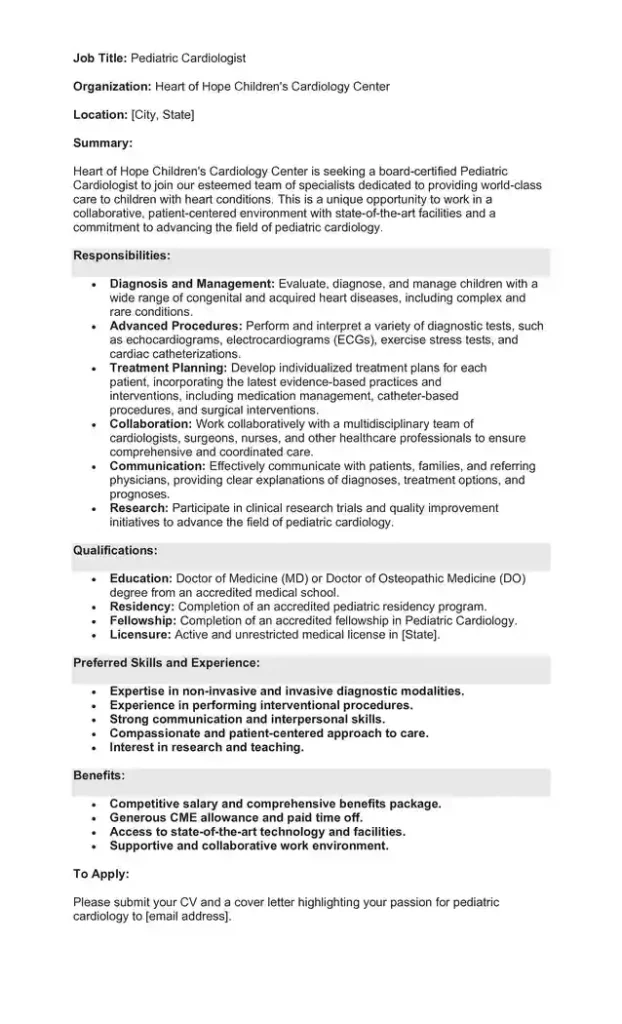
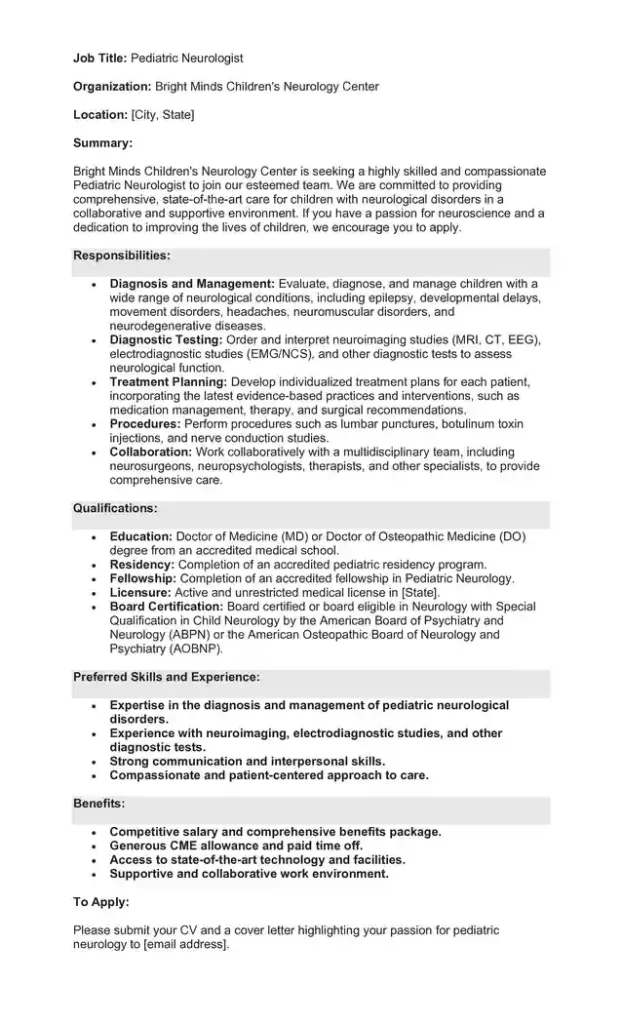
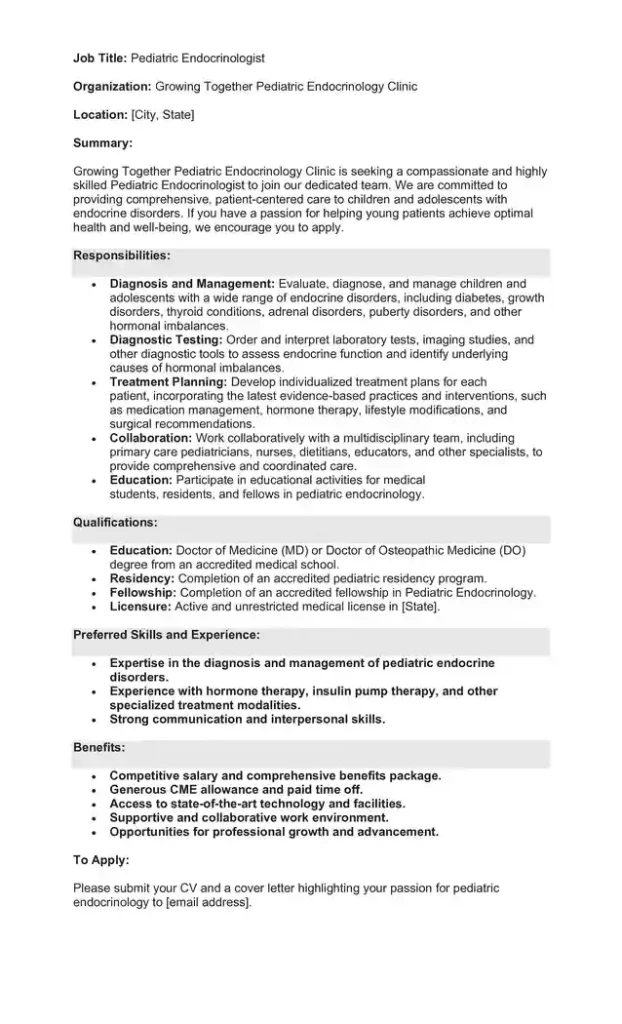
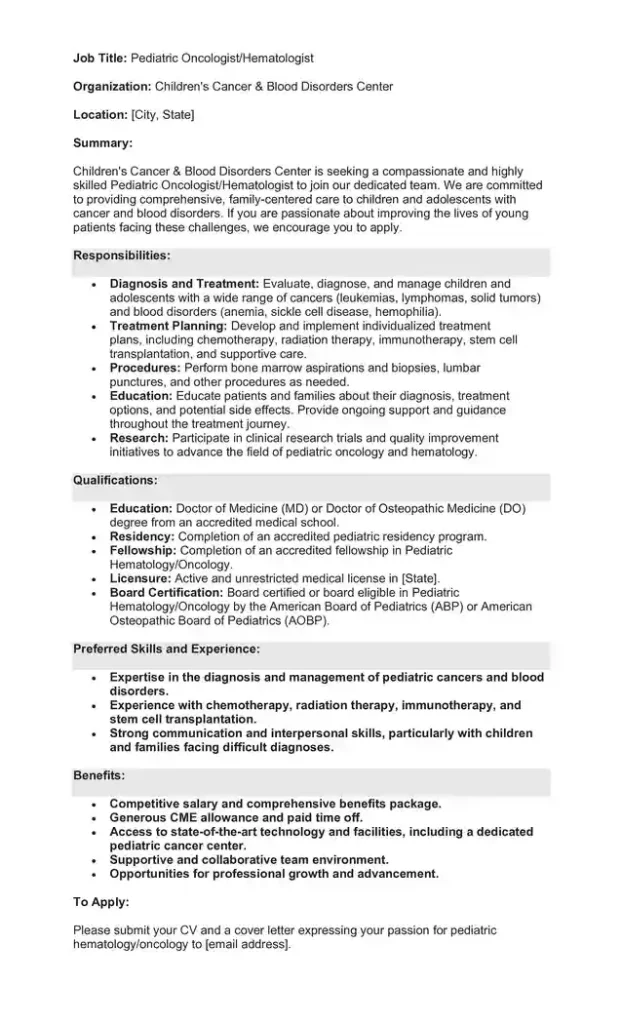
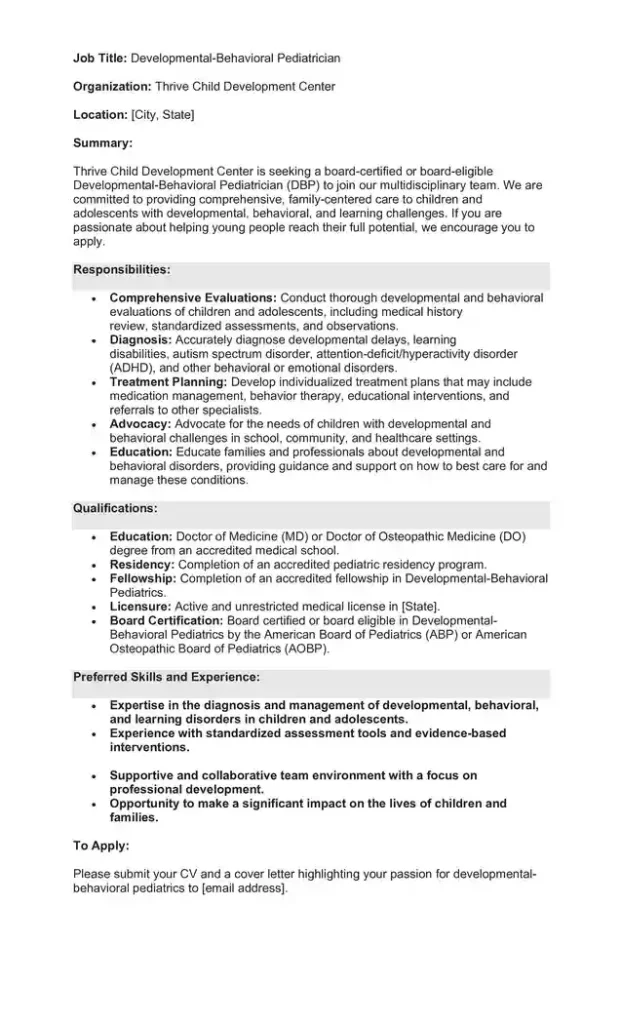
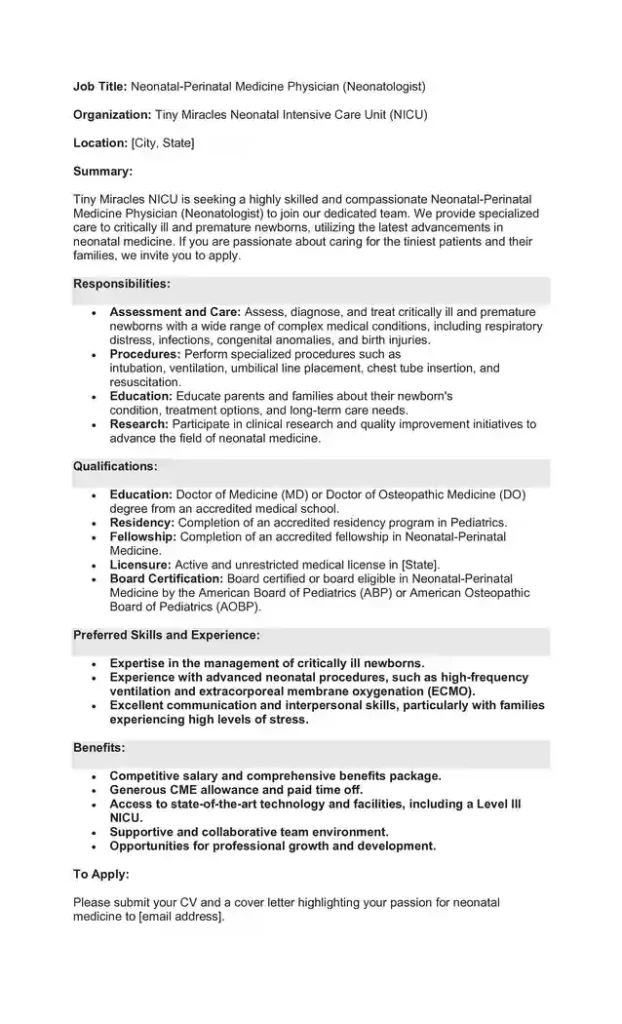
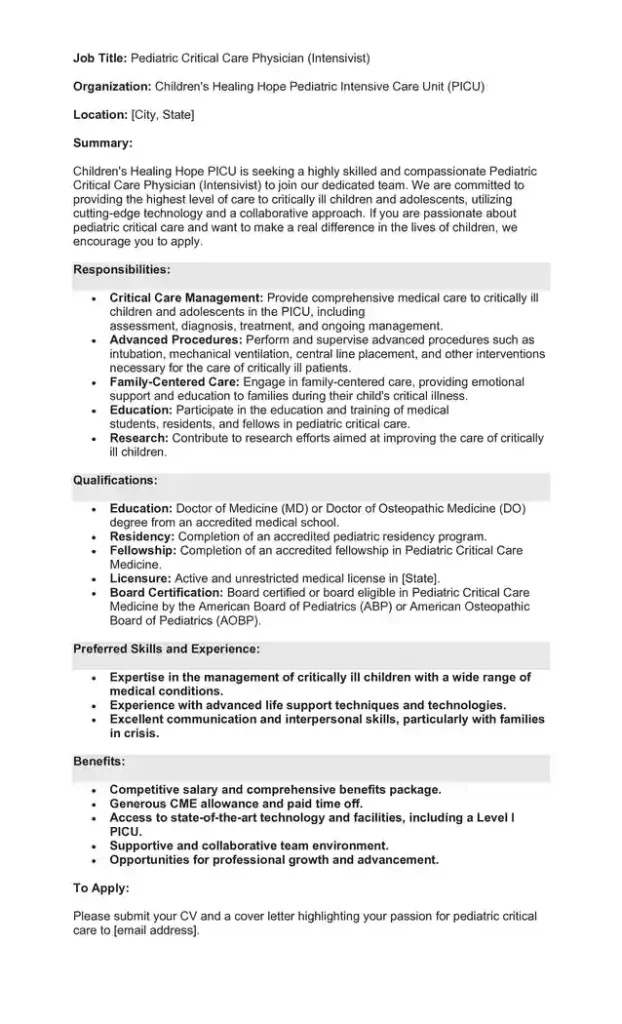
FAQs About Pediatrics
Q: What should I expect during my child’s first visit to the Pediatrician?
A: During the first visit, the pediatrician will check your baby’s weight, length, and head size. They will also do a physical exam and talk with you about your baby’s health and any concerns you might have.
Q: How often should my child see a Pediatrician?
A: Newborns need frequent visits during their first year. After that, children usually see a pediatrician once a year for check-ups.
Q: What is the difference between a Pediatrician and a Family Doctor?
A: A pediatrician specializes in children’s health, while a family doctor treats patients of all ages. Pediatricians have special training to care for the unique health needs of children.
Q: How can I find a good Pediatrician for my child?
A: You can ask for recommendations from friends, family, or your own doctor. It’s important to find a pediatrician who makes you and your child feel comfortable.
Q: Can Pediatricians help with behavioral issues?
A: Yes, pediatricians can provide support and advice for behavioral issues like ADHD, sleep problems, and temper tantrums. They can also refer you to specialists if needed.
Conclusion
Pediatricians play a very important role in healthcare. They take care of children’s health from birth to their teenage years. Pediatricians make sure children grow up strong and healthy.
So, there you have it! A simple job description for a pediatrician. It’s a really cool job where you get to help kids every day. If you love science, like working with kids, and want to make a difference, then being a pediatrician might be the perfect job for you!

Alexander is a skilled HR expert who writes clear and compelling job descriptions. He has spent over 15 years in the HR field, helping companies find and keep the best employees. With a degree in Human Resources Management from the University of Chicago, he has the knowledge to back up his experience.







